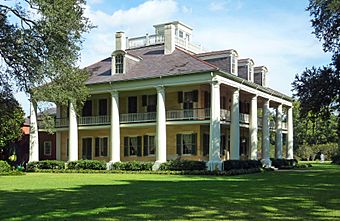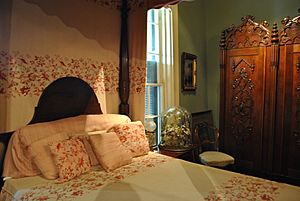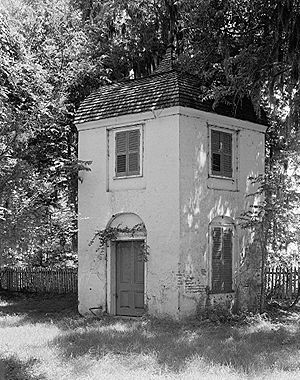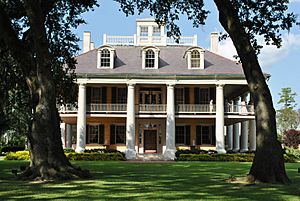The Houmas facts for kids
Quick facts for kids |
|
|
The Houmas
|
|

The main house in 2010
|
|
| Location | West of Burnside, about 0.63 miles (1.01 km) west of intersection of River Road and Louisiana Highway 44 |
|---|---|
| Nearest city | Burnside, Louisiana |
| Area | 10 acres (4.0 ha) |
| Built | 1840 |
| Built by | John Smith Preston |
| Architectural style | Federal, Greek Revival |
| NRHP reference No. | 80001694 |
| Added to NRHP | September 27, 1980 |
The Houmas, also known as Burnside Plantation, is a historic plantation complex in Burnside, Louisiana. Today, it is known as Houmas House Plantation and Gardens. This beautiful estate was first started in the late 1700s. The main house you see today was finished in 1840. The plantation was named after the native Houma people. They were the first people to live in this area of Louisiana.
The entire complex includes eight buildings and one other structure. These buildings and the 10-acre land they sit on were added to the National Register of Historic Places on September 27, 1980. This means it is a special place recognized for its history.
Contents
History of The Houmas Plantation
Early Beginnings and Sugar Farming
The story of The Houmas plantation began in 1774. Two people, Alexander Latil and Maurice Conway, took over land that belonged to the Houma people. Around 1775, Alexander Latil built a French Colonial style house on the property.
By 1803, The Houmas was a working sugarcane farm. This was when the United States bought the area through the Louisiana Purchase. Soon after, Daniel Clark bought The Houmas. He started to develop the land and built one of the first sugar mills along the river. In 1807, Clark and Governor William C. C. Claiborne had a duel on the property.
New Owners and Growth
In 1811, Wade Hampton, a general from the American Revolutionary War, bought Daniel Clark's land and the people working on it. Hampton was one of the richest landowners in the southern United States before the American Civil War.
The oldest building still standing is the original main house. Experts disagree on when it was built. Some think it's the first house built by Latil, just changed over time. Others believe it was built during Wade Hampton's time. It is a two-story brick building with a stucco outside. It has two rooms on each floor with a central hallway. It is connected to the newer main house by a covered walkway.
The Preston Family and a Grand New House
John Smith Preston took over managing the property around 1825. He was married to Caroline Hampton, Wade Hampton's daughter. The Prestons built a new, grand main house in front of the old one in 1840. This new house is a Greek Revival mansion. It is two-and-a-half stories tall. It has 14 large Doric columns on three sides. The roof has arched windows and a small tower called a belvedere.
Other buildings from this time include two matching brick octagonal buildings. These were called garçonnières, or bachelors' quarters. They are two stories tall. The first floor was a sitting room, and the second floor was a bedroom. There are also many other brick buildings nearby that were used for services.
John Burnside's Era
In 1857, John Burnside bought the estate. He was from Belfast, Ireland. The estate was more than 10,000 acres at that time. Within a few years, Burnside made the property even bigger, to 12,000 acres. He also built four sugar mills to process his crops. Before the American Civil War, this was one of the largest landholdings in Louisiana. Many people were forced to work on this plantation and Burnside's other nearby properties.
During the Civil War, there were plans for the plantation house to be used by Union General Benjamin Franklin Butler. He was in charge of New Orleans after the city was captured in 1862. However, Burnside was still a citizen of the United Kingdom of Great Britain and Ireland. He reportedly stopped this by saying that taking his property could cause problems with other countries.
Decline and Restoration
John Burnside never married and died in 1881. He left the estate to his friend, Oliver Beirne. After Beirne, it went to his son-in-law, William Porcher Miles. When Miles died in 1899, the property started to be divided up. The house began to fall apart. The Mississippi River flood in 1927 and the Great Depression made things even worse for the property.
In 1940, Dr. George B. Crozat bought the house and what was left of the land. Crozat started a big project to restore the house and gardens. He removed some of the original decorations to make the house look simpler, in a "Federal style." The house and grounds stayed with his family until Kevin Kelly bought them in 2003.
Filming Location for Movies and TV

The Houmas has been a popular place for filming movies, TV shows, and commercials. It is most famous for the Bette Davis movie Hush… Hush, Sweet Charlotte (1964). In this movie, the house is a very important part of the story.
Other films partly shot at The Houmas include Fletch Lives (1988) and Love, Wedding, Marriage (2011). Television films and series include Moon of the Wolf (1972), A Woman Called Moses (1976), Big Bob Johnson and His Fantastic Speed Circus (1978), All My Children (1981), A Taste of Louisiana with Chef John Folse and Company (1990), Snow Wonder (2006), K-Ville (2007), Top Chef (2009), Midnight Bayou (2009), Revenge of the Bridesmaids (2010), Wheel of Fortune (2011), and The Bachelor (2017). Commercials for companies like Budweiser and Best Buy have also been filmed at the plantation.
See also
- National Register of Historic Places listings in Ascension Parish, Louisiana
- List of plantations in Louisiana
- History of slavery in Louisiana
 | Emma Amos |
 | Edward Mitchell Bannister |
 | Larry D. Alexander |
 | Ernie Barnes |





